The New Testament Library Series (15 vols.)
Digital Logos Edition
Overview
The New Testament Library Series offers 15 volumes of in-depth commentary by many of today’s leading New Testament scholars including Victor Paul Furnish, Luke Timothy Johnson, and M. Eugene Boring. In over 5,000 pages, this series explains the books of the New Testament and expounds upon themes such as Paul’s theology, ethics, and the church’s ministry in the world.
This item is no longer available. Get The Old and New Testament Library series collection.
- Offers 5,000 pages of commentary on and exploration of New Testament themes
- Provides insights from today’s prominent New Testament scholars
- Opens fresh perspectives on Pauline studies
This series provides an extraordinary service to biblical scholarship.
—Reviews in Religion & Theology
Belongs on the shelves of students, clergy, and professional scholars as well as the serious layperson.
—Journal of Biblical Theology
- Title: The New Testament Library
- Series: The New Testament Library Series (NTL)
- Publisher: Westminster John Knox
- Volumes: 15
- Pages: 5,388
- Mark: A Commentary by M. Eugene Boring
- Luke: A Commentary by John T. Carroll
- Galatians: A Commentary by Martinus C. de Boer
- Ephesians: A Commentary by Stephen E. Fowl
- Philippians and Philemon: A Commentary by Charles B. Cousar
- Colossians: A Commentary by Jerry L. Sumney
- I, II Timothy & Titus: A Commentary by Raymond F. Collins
- Hebrews: A Commentary by Luke Timothy Johnson
- I, II, & III John: A Commentary by Judith M. Lieu
- Revelation: A Commentary by Brian K. Blount
- Theology and Ethics in Paul by Victor Paul Furnish
- History and Theology in the Fourth Gospel by J. Louis Martyn
- The Word in This World by Paul W. Meyer
- Images of the Church in the New Testament by Paul S. Minear
- Paul and the Anatomy of Apostolic Authority by John Howard Schutz
This title is included in the following collections
You can save when you purchase this product as part of a collection.
The New Testament Library Seri...
$697.79$592.99Logos 9 Anglican Platinum Lega...
$1,499.99$1,499.99The Old and New Testament Libr...
$2,072.35$1,649.992025 Researcher Diamond Librar...
$2,999.99$2,249.99
- $2,999.99$2,249.99
- $2,999.99$2,249.99
- $3,149.99$2,362.49
- $2,999.99
- $2,999.99
- $3,999.99$2,999.99
- $2,999.99
- $3,999.99$3,399.99
- $4,749.99$3,562.49
- $4,899.99$3,674.99
- $3,999.99
- $5,999.99$4,499.99
- $5,999.99$4,499.99
- $4,749.99
- $6,399.99$4,799.99
- $10,999.99$8,249.99
- $23,999.99$17,999.99
- $24,999.99
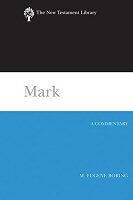
The first New Testament Library volume to focus on a Gospel, this commentary offers a careful reading of the book of Mark. Internationally respected interpreter M. Eugene Boring brings a lifetime of research into the Gospels and Jesus into this lively discussion of the first Gospel.
M. Eugene Boring is professor emeritus of New Testament at Brite Divinity School, Texas Christian University, in Fort Worth, Texas. He is a coauthor of The People’s New Testament, and the author of numerous books of New Testament scholarship, including the best-selling Interpretation commentary on Revelation.
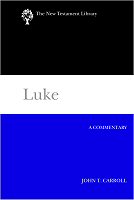
This new, authoritative commentary on the Gospel of Luke epitomizes the New Testament Library series. Combining scholarly rigor and theological insight, John T. Carroll not only focuses on the Gospel text but also makes frequent reference to Luke’s second volume, the book of Acts, to show how the two writings work together to present a full picture of the life of Christ and the work of the apostles. In addition, Carroll includes several illuminating notions about special topics in Luke’s Gospel: a comparison of the birth announcements to Mary and Zechariah, an examination of the role of women, a discussion of wealth and poverty, and insights on the reign of God and the Roman Empire.
Largely free from entering into scholarly debates (but resting on sound scholarship) this commentary on the Gospel of Luke concentrates on expounding the theological narrative of Luke in simple language so that preachers and study group leaders will have a valuable, easily accessible tool with just the right amount of explanatory comment and at an appropriate level for their purposes.
—I. Howard Marshall, emeritus, University of Aberdeen
Here is a significant work on Luke’s Gospel that combines sensitive literary interests with theological acumen. The result is exactly what we might expect from John Carroll: a reliable and thoughtful guide through Luke’s story of Jesus.
—Joel B. Green, professor of New Testament, Fuller Theological Seminary
John T. Carroll is the Harriet Robertson Fitts Memorial Professor of New Testament at Union Presbyterian Seminary, Richmond, Virginia. He is the author or editor of several books, including The Death of Jesus in Early Christianity, Preaching the Hard Sayings of Jesus, The Return of Jesus in Early Christianity, and The Word in This World.
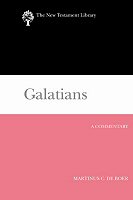
This commentary traces Paul’s theology as it unfolds in his letter to the church at Galatia, and illuminates how the Galatians likely received and comprehended it. The author asks readers to imagine themselves as silent witnesses to Paul’s dictation of the letter and to observe, through a historical perspective, how Christians at Galatia might have understood Paul’s words.
Martinus C. de Boer is professor of New Testament at Vrije Universiteit in Amsterdam.
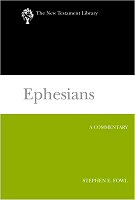
Even though it was written some two millennia ago, Ephesians still speaks to Christians today in themes quite familiar to the modern reader. In a predominantly Gentile context, the Christian community needed to be reminded of the priority of Israel and the astonishing work of reconciliation that God willed to accomplish in the life, death, and resurrection of Jesus Christ. This new volume in the highly acclaimed New Testament Library series reveals the great theological promises of Ephesians while discussing issues of context, authorship, and style.
Stephen Fowl’s rich volume on this rich letter displays his careful reading of the text that yields a truly theological commentary. It focuses on the triune God, the drama of salvation, and the church’s internal unity and faithful witness; it situates the letter within the canon and within the context of Christian theology; it engages ancient as well as recent interpreters, from Irenaeus to Aquinas to Andrew Lincoln; and it imitates Ephesians itself by calling its readers into the fullness of life in Christ. For all these reasons, I enthusiastically commend it
—Michael J. Gorman, Raymond E. Brown Chair in Biblical Studies and Theology, St. Mary’s Seminary and University
Stephen Fowl brings his considerable gifts in theological interpretation to the profound theological message of the Letter to the Ephesians. The result is a refreshingly irenic commentary that reflects a thorough knowledge of the critical discussions while eschewing lengthy debate. Fowl is willing to live with exegetical uncertainties and interpretative ambiguities in order to focus on the text’s illumination of Christian identity formed by God’s actions in Christ, lived out in the church and the world. Achieving this in a clear and highly readable style makes Fowl’s contribution a very worthwhile addition to the commentary literature on Ephesians
—Andrew T. Lincoln, Portland Professor of New Testament, University of Gloucestershire
Reading Stephen Fowl’s work is always a wonderful experience. His prose is tight and clear, his thinking fresh, and his commentary on Scripture always targets the sacred text and what it may teach the church about its relationship with God and one another. The importance of his NTL commentary on Ephesians is not merely that it details the letter’s history of interpretation or its critical prolegomena (although his discussion of its authorship is a thing of intellectual beauty); others have already done this work for us. Rather, Fowl’s contribution is to provide us with a fine example of how careful exegesis and theological interpretation are of a piece, the one funding the other for a reading of Ephesians that will benefit both church and academy.
—Robert W. Wall, Paul T. Walls Professor of Scripture and Wesleyan Studies, Seattle Pacific University
Stephen E. Fowl is the chair of the department of theology at Loyola College in Maryland. He is the author of several books, including Engaging Scripture: A Model for Theological Interpretation, Reading in Communion: Scripture and Ethics in Christian Life with L. Gregory Jones, and the Two Horizons Commentary on Philippians.
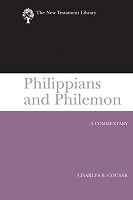
Together, these two letters show much of Paul’s vital passion for the church and the bonds that held early Christians together in their faith.
Charles B. Cousar is the Samuel A. Cartledge Professor of New Testament Emeritus at Columbia Theological Seminary, Decatur, Georgia. Cousar, who has made significant contributions to biblical studies, retired from his position at Columbia Theological Seminary where he received the Distinguished Service Award. He is the author of Theology of the Cross, An Introduction to the New Testament and The Letters of Paul.
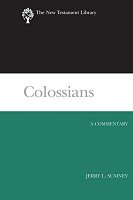
The letter to the Colossians offers great insight into the faith, life, and problems of the early Christian church. Understanding this letter to be one of Paul’s prison epistles but aware of the differences between this and his other writings, Jerry Sumney shows how the church struggled with expressing its new faith in the diverse settings of the Greco-Roman world. Paying special attention to the ways of forgiveness and salvation through the power of Christ, this fine commentary shows Colossians’ expansive Christology and expectant eschatology.
Jerry L. Sumney is professor of biblical studies at Lexington Theological Seminary in Lexington, Kentucky.
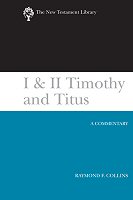
The Pastoral Epistles present difficult questions for the modern interpreter, including such matters as their authorship, literary characteristics, and social orientations. Raymond Collins carefully leads the reader through the texts of these three documents, attending to the flow of the pastor’s thought and locating it within the Jewish and Hellenistic culture of his day.
Raymond F. Collins, PhD, is a priest of the Diocese of Providence and is the dean of the School of Religious Studies at The Catholic University of America. He is the author of John and His Witness and Divorce in the New Testament.
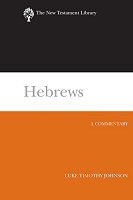
This volume of the New Testament Library offers a thorough and careful commentary on the complicated book of Hebrews, showing its meaning within the context of ancient culture and the theological development of the early church. Written by one of the leading New Testament scholars of the present generation, Luke Timothy Johnson, this commentary offers remarkable insights into the Hellenistic, Roman, and Jewish contexts of the book of Hebrews.
Luke Timothy Johnson the author of the Introduction, Commentary, and Reflections on the Letter of James, is Robert W. Woodruff Professor of New Testament and Christian Origins at the Candler School of Theology, Emory University, Atlanta, Georgia. His works include The Real Jesus: The Misguided Quest for the Historical Jesus and the Trust of the Traditional Gospels and The Letter of James, in the Anchor Yale Bible.
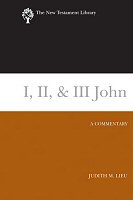
The New Testament’s three letters attributed to John have always provided remarkable theological riches for the Christian tradition, including the assertion “God is love.” Each letter shows how an early Christian author responded to threats against authority by recourse to the correct teachings of the faith and a proper understanding of the relationship between Jesus and God. Together, these letters argue for a bond of unity among believers, based on fidelity to the truth of God.
Judith M. Lieu is professor of New Testament Studies, King’s College, London.
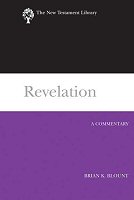
The book of Revelation is one of the most complicated in the New Testament. The book calls for a prophetic reaction to the world and uses some of the most violent language of the entire Bible. Brian Blount’s commentary provides a sure and confident guide through these difficult and sometimes troubling passages, seeing Revelation as a prophetic intervention and at the same time an awe-inspiring swirl of frightening violence and breathtaking hope.
Brian K. Blount is the president and professor of New Testament at Union Presbyterian Seminary. Prior to that he was, for 15 years, the Richard J. Dearborn Professor of New Testament Interpretation at Princeton Theological Seminary.
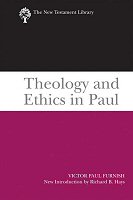
First published in 1968—and out of print since the 1980s—Victor Paul Furnish’s treatment of Paul’s theology and ethics has long been regarded as the key scholarly statement and most useful textbook on Paul’s thought. Now, Theology and Ethics in Paul is available once again as part of the Westminster John Knox Press New Testament Library. Featuring a new introduction from Richard Hays, this timeless volume is as relevant in this century as it was in the last.
Victor Paul Furnish is University Distinguished Professor of New Testament at the Perkins School of Theology, Southern Methodist University, in Dallas, Texas. His numerous publications on and contributions to Pauline studies set him apart as one of the premier New Testament scholars of our generation. Among his published works are contributions to Pauline Conversations in Context: Essays in Honor of Calvin J. Roetzel, available from Logos as part of the Library of New Testament Studies: JSNTS on Paul (17 vols.).
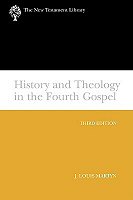
This volume surveys the scholarly work that has been done concerning the book of John. Biblical scholar J. Louis Martyn also provides his own reading of the fourth Gospel.
J. Louis Martyn is Edward Robinson Professor Emeritus of Biblical theology at Union Theological Seminary in New York City. He has written books and scholarly articles on various New Testament topics, notably Theological Issues in the Letters of Paul.
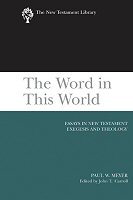
This volume brings together numerous publications that range across the New Testament canon and encompass a variety of forms, from thematic essay to commentary, from close exegesis to homily. All these studies highlight Paul Meyer’s characteristic attention to detail, skilled argument, and engaging prose.
Paul W. Meyer is Helen H. P. Manson Professor Emeritus of New Testament Literature and Exegesis at Princeton Theological Seminary in Princeton, New Jersey.
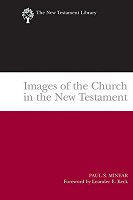
Paul Minear’s classic work identifies and explicates 96 images for the church found in the New Testament. First published in 1960, this volume has been used in seminary classes for over 30 years. Its rich discussions of the many images and metaphors make this book a splendid resource for students and pastors.
Paul S. Minear was Winkley Professor Emeritus of Biblical Theology at Yale Divinity School. Among his numerous books is The Kingdom and the Power: An Exposition of the New Testament Gospel.
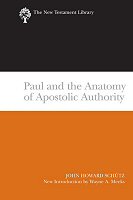
John Howard Schutz’s milestone analysis of Paul’s authority shaped a generation of thought about Paul. This insightful work continues to be relevant to Pauline scholarship.
John Howard Schutz was a professor of New Testament at the University of North Carolina in Charlotte.
Reviews
2 ratings

Leonardo Buscemi
2/23/2017
Jason Egbert
2/5/2017
